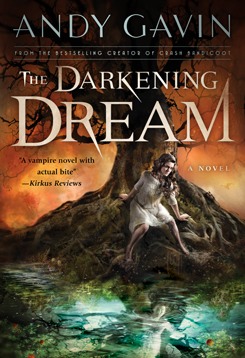 Title: Kushiel’s Dart
Title: Kushiel’s Dart
Author: Jacqueline Carey
Genre: Epic Historical Fantasy
Length: 912 pages, 315,000 words!
Read: June, 2011
Summary: Long, overdone, but intriguing
This book itself as Fantasy, but it’s certainly not your typical one. Really it’s a sort of reinterpreted epic (and I mean long) historical romance — without much of the modern sense of romance (almost none). But it does have plenty of the traditional, more atmospheric form.
This is a flowery first person narrative about a slave girl brought up as a sort of high end courtesan who gets involved — very involved — in politics. I’m going to try and break down and discuss various elements of the work.
It’s worth noting the tremendous length. The book is 900+ pages and feels it. I enjoyed it, but it’s like four novels glued together. This lends it a decidedly Gone with the Wind effect. Just when you think it should be over (except for the fact that you have 650 pages to go!) everything switches up and it moves on to a new stage. This happens several times.
First the setting. With the exception of a bit of prophecy and one large scale pseudo divinity (the Master of Straights) at about the 85% mark this novel really has no magic. And in fact, is actually a sort of disguised work of Historical Fiction. The Fantasy is more the invented nature of the tale than any actual magic. As best as I can tell the whole thing is more or less set in a reinvented thirteenth or fourteenth century France. It felt late medeval or early Renaissance. At times I wondered if it even had overtones of Carolingian (ninth century France). The names of the places and faiths are all changed, but in a recognizable way for those of us who know our European history. Rome is “Tiberium,” Spain “Aragonia,” the Germanic tribes the “Skaldi.” Carey does a good job of this, and her grasp for the flavor and cultures of Europe between the fall of Rome and the modern era extremely solid. The central nation of the novel feels both troubadour French and even a little Late Venetian Republic at times. There are plenty of deviations from real history. First an foremost the loosey goosey religious situation (as opposed to the dogmatic Catholic church). The religions have been reinterpreted and the nation founded by what appears to be an interesting mating of Jesus and Dionysus. An intriguing (and Romantic) mythical entity who was also followed around by a bunch of demi-god disciples who seeded various schools or bloodlines. Overall, the setting was probably my favorite part of the novel.
The voice. At first I loved the voice. Yeah it’s flowery. Girly. Really girly. And full of words that the Kindle dictionary informed me were “archaic” or just chosen for plain weighty flavor. Words like “limned” or “ague.” The sentences have an unusual and formal structure. There is a LOT of reppetition. This began to wear on me. Carey reminds you like 50 times who everyone and everything is, which considering the vast cast of characters and the incredibly complex political situation might be necessary for those that don’t have a semi-photographic memory or an obsessive knowledge of European history. The narrative is first person, and told from some unspecified far future point in Phedre’s (the protagonist) life. It’s the antithesis in many ways of my own voice, as it’s really really really heavy on the TELL and fairly light on the SHOW. Carey loves to insinuate before the action (when it occasionally occurs, separated by many many pages, but often enough given the titanic length of the book) that things won’t turn out as planned, or that something bad is about to happen. Lots and lots of stuff is done with narrative summary. I myself try to set everything in scene and tell it as it happens in a more hard boiled style, more like the Maltese Falcon or the Big Sleep, even if the subject matter is very different. Carey chooses a more sentimental approach. But at the same time I found the voice very distancing. A lot of this is the feeling that it is written looking back on events, which removes a lot of the tension inherent in the action. The rest is probably the TELL factor.
I liked the whole sex-slave-girl-bondage-courtesan angle. But Phedre is a little too good at just about everything other than pure agressive bravery, and she has her constant companion the warrior-monk for that. While bad things do happen to her, she pretty much flawlessly reads every situation and is titanically lucky / unnaturally talented. I still kinda liked her. And the fact that she has a lot of edgy sex is good. The book alternates between graphic and evasive in this realm, which ends up being more teasing than satisfying. Still, I guess normal people might find it dark.
Now the overall affect of this novel is pretty good. It starts off great. But it sometimes bogs under volumes of political talk I found excessive — and I read multivolume political histories for pleasure! Some of the sub-adventures (like Phedre’s time as a Skaldi slave) are really good and there are lots of varied settings, cultures, and characters. I also really enjoyed the depth of world building and the alternate but very “realistic” religious mythos. But…
There is absolutely no psychological realism to any of the characters, our protagonist included. The central condition of Phedre’s nature is supposed to be that she finds pain and suffering intrinsically hot. Even this isn’t really handled totally consistently. The rest of the people — while interesting and possessed of different traits — merely serve the story or the need to roster out a bunch of interesting types. The don’t feel exactly cardboardy, as they are detailed, but unlike the completely brilliant Game of Thrones, there is no fundamental relationship between the different nature of different personalities, their situations, and the decisions they make and the consequences those decisions bring.
In the end, I found the way in which things just sort of grandly worked out for Phedre tedious. The big war at the end is complex, but summarized, and the wrap up phase of the story nearly 100 pages. Carey also just loves to throw in grand and sumptuousness just for it’s own sake, which at the beginning felt lush, but by the time Phedre has dressed in 62 elegant gowns a bit much.
Still, I kind of liked the book, if only for its world and its very creative reinterpretation of medeval/renaissance fantasy. At times it reminded me of Guy Gavriel Kay, but his works felt somehow a bit more connected to place and certainly more emotional.



